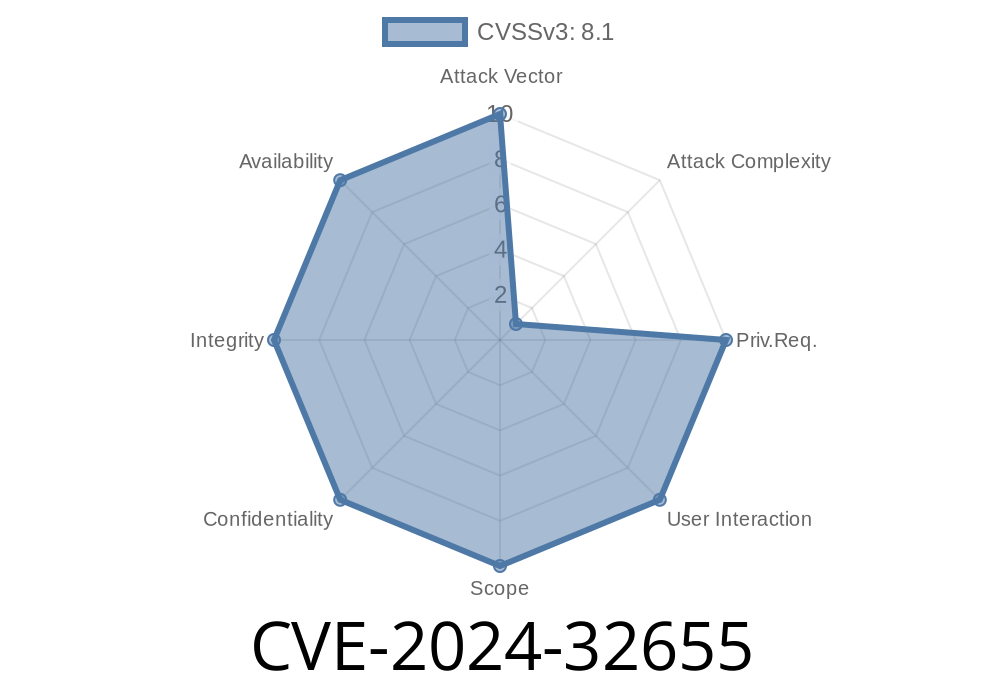Date: June 2024
Npgsql Version Affected: Up to 8..2 (Fixed in 4..14, 4.1.13, 5..18, 6..11, 7..7, and 8..3)
Impact: Remote Arbitrary SQL Execution
Npgsql is the widely used .NET data provider that allows applications to communicate with PostgreSQL databases. In early 2024, a critical vulnerability was uncovered in the way Npgsql builds and sends protocol messages to PostgreSQL—a flaw that can give attackers the ability to smuggle arbitrary SQL commands through an integer overflow in the WriteBind() message handling code.
This post dives deep into CVE-2024-32655, showing how the vulnerability works, how an exploit might be crafted, and how you can protect your applications.
Understanding the Npgsql Bug
At the heart of the issue is how Npgsql handles the construction of the "Bind" message—the message sent to PostgreSQL to bind statement parameters. Internally, it builds each message with a header specifying its length, so that PostgreSQL knows where one message ends and the next starts.
But here’s the flaw:
In the code below (src/Npgsql/Internal/NpgsqlConnector.FrontendMessages.cs), the message length and the sum of all parameter lengths are kept in int (32-bit) variables:
// Pseudocode excerpt (simplified)
int messageLength = ;
foreach (var parameter in parameters)
{
messageLength += parameter.Length;
}
// ... Later ...
WriteInt32(messageLength);
WriteBytes(parameterBytes);
Suppose you have a lot of parameters, or just a few extremely large ones. Given enough size/number, messageLength will overflow a signed 32-bit integer, wrapping around into a small (even negative) number.
When Npgsql serializes the bind message, it writes this tiny (wrapped-around) message length into the message header, followed by data that may actually be much bigger. On the wire, this leads PostgreSQL to believe the message is much shorter than it truly is.
Consequence: Protocol Message Smuggling
When PostgreSQL receives a message, it reads just the number of bytes specified in the header. The next bytes—even though they should be part of the original bind message—look like a brand new protocol message to the database.
If an attacker can control the parameter sizes (for example, by sending giant user-controlled parameter values), they can smuggle arbitrary PostgreSQL protocol messages into the stream. By carefully crafting these, they can in effect inject raw PostgreSQL protocol operations—including arbitrary SQL queries—to be executed within the context of the application’s permissions.
Exploit Walkthrough
*Let’s walk through a simplistic exploit scenario:*
1. Attacker identifies the application uses Npgsql and accepts many/large parameters from untrusted sources (e.g., a bulk upload API).
2. Attacker crafts enough parameters (or makes them big enough) that the sum of their lengths overflows the 32-bit signed integer. In C#, this wraps around to a negative or tiny positive value.
Application executes a parameterized statement using these values.
4. Wire-level: The message header says, for example, "here comes 128 bytes," but the body is actually 4096 bytes long.
5. PostgreSQL reads the first 128 bytes as the bind message, then interprets the next 3968 bytes as a new message.
6. Attacker encodes a valid PostgreSQL protocol message after the 128th byte—say, a simple "Execute random SQL" protocol message—using knowledge of the wire protocol.
Let's see what might happen at protocol level.
# Pseudocode: Send oversized parameter array to .NET API using Npgsql
parameters = ["A" * (2**31 // 4)] * 10 # Build enough params to cause overflow
# When Npgsql builds the bind message, messageLength wraps around
# Let's imagine the result is 128 bytes (overflow)
# Actual data after header = ~4096 bytes
# After PostgreSQL reads "the first 128 bytes" as a complete message, the next bytes
# can be structured as a Postgres protocol 'Query' message with arbitrary SQL:
#
# | Header | Real Data | <--overflow boundary --> | Query Header | SQL string | etc...
A real PoC would require precise manipulation of the parameter data to turn the "overflow" bytes into valid protocol messages, which is feasible with knowledge of the PostgreSQL wire protocol.
Why Is This So Dangerous?
- Bypassing Parameterization: Normally, ORMs like Npgsql prevent SQL injection by using parameters, not string concatenation. This bug lets attackers get raw SQL to the database anyway, right through the ORM and parameterization.
- No Role Separation: The injected SQL operates in the context of the application’s database user—potentially with high or even superuser privileges.
- Stealth: Many web application firewalls or monitoring systems won’t see these attacks, since everything looks like legal parameterized queries on the surface.
Official Fix and Mitigation
The Npgsql team acted fast. The following versions patch this bug by changing message length accumulation to use safer integer types (e.g., long) and by validating buffer sizes before message construction:
8..3
> Upgrade is the only safe action. There are no workarounds.
Upgrade references:
- Npgsql Release notes
- GitHub CVE advisory
- CVE-2024-32655 MITRE Entry
How Should You Respond?
1. Upgrade Immediately.
Check your Npgsql version and bump to the latest patch for your supported branch. No config or code changes required—just update the library.
2. Audit Your Code.
Look for places where user input can influence query parameters—especially bulk or variable-length input. Even if you've upgraded, this is good practice.
3. Monitor Your Applications.
Until patches are applied, monitor for unusual SQL activity, especially unexpected queries or schema changes.
Conclusion
CVE-2024-32655 is a wake-up call:
Even the best libraries can hide dangerous integer overflow flaws. When dealing with wire protocols and user input, always use safe integer arithmetic. For everyone using Npgsql: upgrade yesterday, not tomorrow.
Further Reading
- Understanding Integer Overflows in .NET
- PostgreSQL Frontend/Backend Protocol
- Npgsql GitHub Security Advisory
Secure your .NET stacks—update now!
*Content exclusive for this post. Please cite the references above for any reproductions or further reading.*
Timeline
Published on: 05/14/2024 15:36:51 UTC
Last modified on: 06/04/2024 17:51:31 UTC
